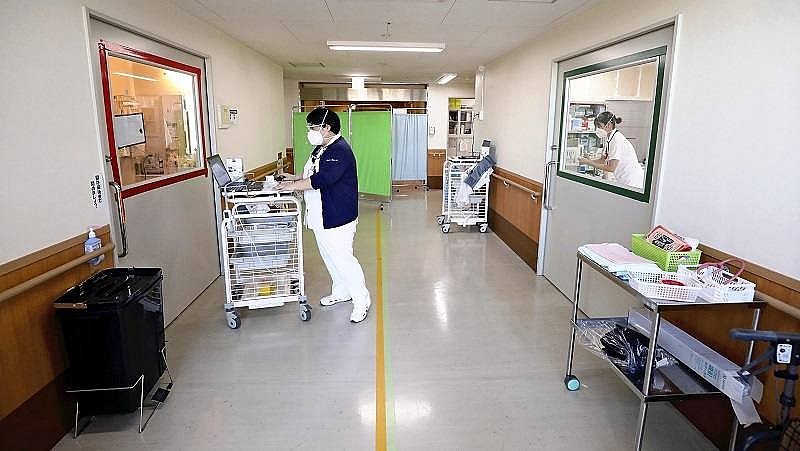Top 10 Best Hospitals In Japan of 2025, Ranked By Newsweek and Statista
In Japan, hospitals are the primary setting for many medical professionals, including dentists and medical experts. Certain hospitals are prepared to provide translation services for their international patients.
Are There Good Hospitals in Japan?
Japan has some of the best hospitals in the world. Their clean facilities and new therapies are praised by patients from other countries. There are about 8,500 hospitals in Japan, which means that for every 15,000 people, there is one. Think about how hospital hours might look shorter compared to those in the US and Europe. The hospital isn't always open on holidays and the weekends. Also, not all hospitals offer emergency care or care after hours.
Hospitals in Japan are popular with medical tourists who want to get reliable, high-quality care. They come to get stem cell treatments, cosmetic surgery, help with finding and treating cancer, and other things. To help with this, Japan has a medical visa that lets people from other countries come to the country for up to a year to get medical care. Most people who go to Japanese hospitals and clinics do so with a normal tourist or business visa.
Foreigners have mostly good experiences in Japanese hospitals, but sometimes they have problems. Almost every hospital in Japan asks patients from outside of Japan to get in touch with them first. This is because the hospital staff might not speak your language. If that happens, the hospital needs to provide translation services. When you see a new doctor, try to go with a family member or friend who speaks Japanese if you can.
The Japanese health care system is aware of these issues and is working to fix them. Japan's international hospitals have a number of accreditations that help them care for patients from other countries. The Japan Medical Service Accreditation for International Patients (JMIP) gives its seal of approval to hospitals and clinics that treat patients from other countries very well. JCI, which stands for the Joint Commission International Quality Check, also does.
What Is the Price of a Hospital Visit in Japan?
No hospital in Japan, public or private, is run to make money. This means that hospital costs are about average compared to other countries.
All foreigners in Japan can use the ambulance service for free. If you are not Japanese and don't have health insurance, you will have to pay for the care that paramedics give you. Most of the time, this care fee is less than $75 USD.
When they go to hospitals or clinics, people from other countries have to pay for everything, even emergency care. This is because foreigners are not covered by the Japanese health system. Hospitals do not charge your health insurance; you are in charge of getting reimbursed and keeping your own records.
Someone from another country might have to pay extra, like $20 to $100 to go to the emergency room. This is on top of the $70 to $100 that doctors charge for consultations. A CT or MRI scan costs $35 to $50, while most x-rays cost less than $10.
How much does it cost to stay at a hospital in Japan for the night? If you choose the right parameters, yes. A bed in a hospital can cost anywhere from $100 a day for a shared room to $800 a day for a fancy private room. You will be charged $1 to $5 for each meal. There may be an extra charge for foreigners who need to stay in the hospital. Usually, this is less than $1 and is between 30 and 50 yen.
Private clinics that are open after hours charge a little more. It costs them, on average, between $110 and $200 to see a doctor and get services like x-rays, medical records, and hospital referral letters.
 |
| Top 10 Best Hospitals In Japan 2025 By Newsweek and Statista |
Top 10 Best Hospitals In Japan 2025, Ranked By Newsweek and Statista
1. The Tokyo University Hospital
Website: http://www.h.u-tokyo.ac.jp/
Currently, The University of Tokyo Hospital performs more than 11,000 procedures annually, making it one of the highest indicators among national university hospitals. It serves 700,000 outpatients annually (an average of 2,900 per day) and 360,000 inpatients annually (an average of 980 per day). Four thousand clinic representatives attend to the needs of patients. In addition to physicians and nurses, additional professionals who fall under this category include pharmacists, registered dietitians, physiotherapists, occupational health specialists, clinical radiologists, clinical laboratory technicians, clinical engineers, and administrative workers.
2. St. Luke's International Hospital
Website: http://hospital.luke.ac.jp/
Located in Tokyo, St. Luke's International Hospital is a sizable general hospital that serves as a globally renowned teaching ground for medical professionals, including postgraduate physicians and nurses.
With 539 beds, the clinic sees 2,550 outpatients a day on average.
The multidisciplinary hospital has an extensive list of departments, including departments for oncology, dermatology, neurology, all forms of surgical care, cardiac and pediatric surgery, psychosomatic medicine, outpatient care center for children (pediatrics, pediatric surgery, Well Baby Clinic), and internal medicine with all specializations.
The clinic also features a number of highly specialized clinics, including a gastroenterology center, breast center, kidney center, and psychiatric center, to help in especially challenging circumstances.
READ MORE: Top 20 BEST HOSPITALS 2024 in the U.S Ranked by Newsweek
3. Kameda Health Facility
Website: https://www.kameda.com/us/index.html
In the southern part of Chiba Prefecture is a privately operated hospital called Kameda Medical Center. Kameda General Hospital, with 917 beds and 500 full-time doctors specialized in everything from traditional medicine to the most recent advancements in cancer therapy, is part of the KMC complex. Every day, more than 3,000 individuals seeking high-quality medical care visit Kameda Clinic, an outpatient institution.
For patients in need of long-term rehabilitation care, the facility also has a level-I Emergency/Trauma Center and a Rehabilitation Hospital. Another highlight of Kameda is its state-of-the-art diagnostic imaging facility, which features the newest MR/CT scanners as well as PET-CT (Positron Emission Tomography – Computed Tomography) technology.
4. Hospital at Kyushu University
Website: https://www.hosp.kyushu-u.ac.jp/En/
With more than 1,400 beds and over 3,000 staff members, Kyushu University Hospital is the biggest national university hospital in Japan. It provides the best care available as a "last resort" in regional medicine. The clinic is one of the leading global hubs for genetic medicine and transplantation in cancer.
5. University Hospital of Nagoya
Website: https://www.med.nagoya-u.ac.jp/hospital_en/
The JCI has accredited Nagoya University Hospital, another top-tier medical facility in Japan. They offer both routine and emergency care.A makeshift public hospital was built where the Nagoya Clan's judicial council once stood; it closed in February 1872.
READ MORE: Top 7 Most Prestigious Vet Hospitals In Europe
6. The National Center for Global Health and Medicine's Center Hospital
Website: https://www.hosp.ncgm.go.jp/en/index.html
Reputable medical organization focused on infectious illnesses, medical research, and global health challenges is the National Center for Global Health and Medicine.
Team and Specialties: The hospital employs a diverse group of professionals with expertise in emergency medicine, tropical medicine, infectious illnesses, and public health.
Infrastructure: The hospital provides cutting-edge care and undertakes essential research in global health thanks to its state-of-the-art facilities and sophisticated research laboratories.
7. Kyoto University Hospital
Website: https://www.kuhp.kyoto-u.ac.jp/english/
Renowned for its dedication to promoting medical research and providing top-notch patient care, Kyoto University Hospital is a distinguished medical facility connected to Kyoto University.
Team and Specialties: Cardiovascular diseases, neurology, oncology, and pediatrics are just a few of the many medical specialties that the hospital employs.
Infrastructure: Kyoto University Hospital provides patients with a wide range of diagnostic and treatment services thanks to its cutting-edge facilities and cutting-edge medical technologies.
8. Hospital at Keio University
Website: https://www.hosp.keio.ac.jp/en/
Keio University Hospital is well known for providing compassionate care and cutting-edge therapies in a patient-centric manner. The esteemed Keio University School of Medicine is connected to it.
staff & Specialties: The hospital's committed staff is made up of highly qualified professionals with exceptional backgrounds in organ transplantation, regenerative medicine, cancer therapy, and cardiovascular illnesses.
Infrastructure: Keio University Hospital offers patients cutting-edge healthcare services thanks to its sophisticated facilities and state-of-the-art medical equipment.
9. Toranomon Hospital
Website: https://toranomon.kkr.or.jp/global/
From the outset, the clinical department was organized according to specialization, with the goal of delivering advanced medical treatment through the placement of qualified physicians in each area. At the moment, the main hospital's thirty departments make up the medical system. Additionally, by achieving differentiation and comprehension in medical treatment through collaborative medical examination activities like cooperative examination with other departments and screening for other departments, we are establishing a system that achieves more intensive and high-level medical treatment.
10. University Hospital in Osaka
Website: https://www.hosp.med.osaka-u.ac.jp/english/
A renowned hospital that integrates clinical treatment, teaching, and research is Osaka University Hospital. It functions as a hub for cutting-edge medical procedures and novel therapeutic approaches.
Group And Expertise: Within the hospital is a group of highly skilled professionals that are experts in cardiology, oncology, transplant surgery, and pediatrics.
Infrastructure: Osaka University Hospital has state-of-the-art equipment, including operating rooms, specialist departments for rehabilitation and critical care, and advanced imaging technologies.
In summary
Even by the most technologically advanced state in the world's standards, the hospitals on the list of the greatest clinics in Japan are highly equipped. Physicians are educators and researchers as well. The only way to become a doctor is to compete fiercely.
Being a doctor here is extremely prestigious, and even the most humble doctor has to be the best of 400 persons by the conclusion of his training to graduate due to the high population density and volume of applicants. There is no such thing as subpar medicine or inadequate diagnostic and treatment tools.
 Top 10 Best Hospitals In North Carolina 2024 By US News and Healthgrades Top 10 Best Hospitals In North Carolina 2024 By US News and Healthgrades Explore the top 10 hospitals in North Carolina for the year 2024 and discover their ratings and patient experience. |
 Top 20 Best Hospitals In Canada 2024 - 2025 By Newsweek and Statista Top 20 Best Hospitals In Canada 2024 - 2025 By Newsweek and Statista The Canadian healthcare system is well known for its dedication to offering top-notch medical treatment to its citizens. A person's ability to access reputable, first-rate ... |
 Full List of the 250 America Best Hospitals in 2024/25 by State, According to Healthgrades Full List of the 250 America Best Hospitals in 2024/25 by State, According to Healthgrades Healthgrades released its annual "America's Best Hospitals Awards," which recognizes the 250 top hospitals in the country 2024/2025. |



























